Children of Destiny Books 1-3 (Texas: Children of Destiny Book 9) Read online
Page 47
Kirk felt a tight, sinking feeling in the middle of his gut as he escorted Anna Montez toward her seat in the rapidly filling theater. Parading behind them down the plushly carpeted aisle were the rest of the Jacksons—Mercedes and Wayne, Megan and Jeb, and Amy and Nick. Kirk was a desperate man, a doomed man running out of time.
He felt that he was being torn between the woman he loved and the family that he loved as dearly as his own.
For days he’d stalled Mercedes with telephone calls.
“But she’s my daughter,” Mercedes always pleaded.
“Give her time.”
Half an hour ago at the Jacksons’ suite at the Plaza, the entire family had attacked him when he’d come for them alone.
“Where’s Dawn?” they had demanded in unison.
“In her dressing room with her ankle packed in ice. She’s trying to conquer a case of stage nerves.” He’d tried to make his voice light and casual.
“But didn’t you tell her we were here?” Jeb said, persistent as ever.
Jeb was the closest thing to a brother Kirk had ever known.
Wishing himself a million miles away, Kirk had shoved thick curtains aside with a trembling hand and stared out the windows at Central Park. “Dawn’s not up to dealing with her family yet, Jeb. She’s not over the ordeal of the desert.”
Mercedes was fighting back tears. “That’s what you said last week. Did you even tell her about us? About me?” she had pleaded.
“She knows,” came Kirk’s grim low tone.
“You mean...she doesn’t want to meet us?”
Kirk’s fingers tightened on a wad of drapes. Hadn’t they any idea they were lacerating him with their questions? “Look, I told you she’s been through a rough time. The second kidnapping brought back the trauma of the first, and she hasn’t been able to deal with her feelings. She doesn’t remember...anyone. She’s afraid.”
“You said to give her a week.”
“You’ll meet her after the performance,” Kirk had replied tautly.
Though she said nothing more, Mercedes’ eyes had glazed with pain. She was too perceptive not to realize he was holding something back.
The usher flashed a light on Kirk’s tickets. “Your seats, sir.”
“Thank you.”
As Kirk sank into his seat between Anna and Mercedes, he wondered for the hundredth time whether he should have told Dawn the Jacksons were coming.
No. She had been too nervous about dancing as it was.
Still, he felt that by not telling her, he had betrayed her.
Mercedes clutched Kirk’s hand, and as he bent his dark head to hers, he cursed his evil luck that he had ended up sitting by her. The last thing he wanted was to hurt her.
“Julia doesn’t want us, does she, Kirk? She doesn’t want me. That’s what you’re too kindhearted to say, isn’t it? She has her life here, and that’s all she wants.”
Kirk turned away, a knot in his throat making it impossible for him to speak. He was thankful for the crashing, commanding chords of the overture. It was the theme of the evil fairy Carabosse and the curse she’d put on the ballet’s heroine and her family.
With his silence, Mercedes had her answer, and as the music began and the curtain went up, silent glistening tears dampened her cheeks.
Kirk understood her pain too well. Tonight he was losing the woman he loved, too, as surely as Mercedes had lost her daughter all those years ago.
The haunting drama of Tchaikovsky’s music filled the theater, but Kirk did not hear it.
Why did it always have to be this way for him? First his mother, then Julia, the little girl he had adored. Then his father. Would it always be his fate to love and lose? Why couldn’t he have fallen in love with some rancher’s daughter from Texas? Someone ordinary instead of a world-famous ballerina? Someone who didn’t even know there were such things as tutus and pink satin toe shoes?
The violent music was interrupted by a melodious harp, which introduced a soft, slow, magical, compassionate theme—the melody of the Lilac Fairy, whose beauty and goodness would triumph over the evil fairy’s challenge.
Though Kirk said nothing, his large hand closed over Mercedes’ as if he sought to impart his strength to her.
Lincoln’s version of The Sleeping Beauty was magnificent. The muted grandeur of the setting was calculated to give prominence to the dancers, and the costumes had all the splendor one could want without any exaggeration of color or proportion.
Dawn danced Aurora as never before. For was it not her own story, the story of lost years, of living in a dark dreamworld, of being cut off from one’s real life? Oh, why was it so much easier to assume the identity of a make-believe character and dance than it was to live one’s life in the unpredictable wilderness of a too-real, unchoreographed world? Why was it so much easier to be Aurora, awakening to real life and true love, than to be herself and do the same things offstage?
The curtain came down after the last act to the thunder of applause. Everyone in the audience leapt to their feet and clapped. Kirk got out of his seat, went quickly backstage, picked up the bundle of flowers he had brought Dawn and gave them to Lincoln to take to her.
Dawn was breathless from the last mazurka, but on her fifth curtain call, she beckoned to Kirk. He pretended to ignore her by skulking behind a curtain, but she came after him and dragged him reluctantly on stage where she handed him a rose from her bouquet. She looked at him, smiling shyly, and blushed radiantly. It was a public gesture of her love for him, and the audience clapped more wildly than ever before.
Even Lincoln was pleased. Tomorrow the cowboy and the ballerina he had rescued from Middle Eastern terrorists, would again be a hot news item. Everyone would demand to see Dawn dance, and that would mean increased ticket sales.
The stage lights blinding him, Kirk’s cheeks darkened. His tense body froze, and he crushed the rose between his taut brown fingers. Dawn had meant to show Kirk how much she loved him, but what she’d shown him instead was how different they were. She was a creature of light and dazzle, of fame and fortune. He was a private man, a man uncomfortable with such a public display of devotion. Grimly, for her sake, he endured the spotlights and the deafening applause.
Dawn received numerous curtain calls, and every time she came out from between the rich black velvet folds of cloth, the audience went wild, whistling, cheering, clapping.
And every time that happened, Kirk felt something vital and precious in his chest withering and dying.
*
Dawn’s dressing room was jammed with flowers, cards and elegant people. Most of all with laughing, shouting, smoking people who wanted to bask in the limelight of Dawn’s glamour and success. They were Lincoln’s friends, wealthy patrons who supported his theater.
Dawn could hardly endure their compliments. She wanted Kirk, only Kirk, and the warmth and strength of his comforting presence, not these strangers with their artificial smiles, not these people who surrounded her only because contact with someone famous gave them an emotional high, not these rich mothers all vying for pairs of her autographed toe shoes for their little girls. Kirk didn’t care about her fame or her ballerina aura; he cared only for her, for the woman she was. It was ironic that on her greatest night of triumph as a dancer, never before had she longed so fervently to be only a woman. But Kirk had vanished the moment he’d managed to escape.
Behind the facade of her glamour, Dawn was in an agony of physical pain. Her toes were bloody and aching and wouldn’t point; her ankle swollen as always. She wanted to remove her stage makeup, pack her ankle in ice, put on something more comfortable than her glittering white-and-gold costume and spend the rest of the evening alone with Kirk. But in an hour, Lincoln was throwing his party in her honor.
In the corner Lincoln was giving an interview to a reporter.
“The dancer, no matter how wonderful, is never more than an instrument of the gifted choreographer. I am forced to work with dancers, each of whom has a distinctive will, personality
and a set of performing characteristics. Some of the most wonderful dancers are the most difficult.”
“And Miss Hayden?”
At Lincoln’s hesitation, a hush fell upon the room.
“She is one of the most wonderful.”
“And one of the most difficult?”
After a sensitive silence, Lincoln merely ran a tanned hand through his flaxen hair, raised his brows and smiled benignly.
Dawn flushed, and Lincoln’s audience laughed quietly.
Dawn dug her nails into her palms. Dancers meant nothing to Lincoln beyond their usefulness in his artistic medium. She was not even a person in his eyes. Just an instrument. Necessary to him. Something to be endured despite limitations. When Dawn could no longer dance, he would find another, younger dancer with her own distinctive will.
Where was Kirk? Why hadn’t he come? He had seemed so grim on stage when she had given him the rose to show him how much she loved him. His body had felt alien and tense and his gaze cool when she’d tried to touch him. But surely he would not leave her without saying goodbye. Surely... Didn’t he know how much she needed him? Now more than ever?
Since he hadn’t come to her, the darkest terrors of her imagination overpowered her rational mind.
Blinking to keep back tears, Dawn rose from her seat and hobbled through the throng, intent on finding him.
She stepped out into the dark hall, and there he was, standing in a pool of light. She would have rushed toward him, but he was not alone. Two lovely, older, dark-haired women, a matched pair in glittering jewels and dark evening gowns, clung uncertainly to his arms. With them also was a silver-haired man and two handsome younger couples.
Instantly Dawn recognized Anna Montez, though she was older now than in the picture in Lincoln’s office. Dawn’s gaze left her aunt’s face to rest on Mercedes’.
Her biological mother?
There was a nightmarish unreality about the moment. A dazzle of blinding whiteness suddenly made it difficult for Dawn to see, impossible for her to breathe.
But surely that gently lined face framed with dark hair was the sweetest and dearest on earth. Dawn felt the woman’s dark, luminous eyes, so like her own, fasten on her face, upon the golden medallion against her throat.
Dawn’s shaking fingers went to the gleaming pendant. Mother...
“You’re alive,” Dawn whispered in strangled disbelief. “Alive... I thought...” She had no idea that she had spoken out loud. The back of her head was throbbing. The world whitened.
She swayed forward, but her feet didn’t move.
It was the face she dreamed of every night and yet forgot every morning that she had. It was the face she had blocked out of her mind because it was too belovedly painful to remember.
Her mother’s face dimmed and whitened as the intense light consumed everything in its blistering flame. Dawn’s head pounded with some ancient forgotten terror.
Far away, she heard the sound of someone screaming. The world seemed dreamlike, unreal, separated from her by a shield of black glass.
A child was crying in the night for her mother; crying in a night that never ended for a mother who never came.
Dimly, Dawn realized she was that sad, lost child.
In a single blinding flash, her memory of that awful time came back to her. She remembered not only the things Kirk had told her in London, about the men coming to the ranch and kidnapping her, but the terror of that time afterward.
She’d been locked in a dark trunk, and then a dark closet, for countless days and nights until she’d thought she’d go mad from the darkness. All she had thought of during that awful time was her mother’s face. All she had dreamed of was her mother coming, of her mother miraculously finding her somehow and saving her.
The men had laughed cruelly at her tears and taunted her. “Your mother’s dead. She doesn’t love you. You will never see her again.”
At first Dawn hadn’t believed them. Then they’d gone away and left her all alone in the dark, telling her not to try to escape, that they were coming back. One of them had returned with a knife and said he had to kill her. Then he hadn’t been able to, so he’d let her go on a terrible street. She’d searched for her mother, but she’d never found her. Dawn remembered feeling lost and afraid, more afraid than she’d been even with the kidnappers.
Slowly she’d come to believe the men’s words. Her mother hadn’t loved her, hadn’t saved her. Her mother had betrayed her. Then Dawn, the child, had buried that agonizingly painful knowledge safely inside herself and begun the arduous task of starting her life over with strangers.
In the dark hallway, Mercedes’ lovely anguished face seemed to spin at the center of a dizzying whirlpool of light and pain. Dawn wanted to reach out to her, but she lacked both the strength and courage.
Dawn was fainting, dying. Her heart seemed to be bursting in two.
Dawn wanted her mother. She didn’t want to want her mother. It hurt too much to want. And never to have. She clawed the air like a sightless person and tried to reach her. She was only vaguely aware of strong arms subduing her.
Slowly the awful sensation receded, and she came back to the present. She was wrapped tightly in Lincoln’s arms. Her dark head was pressed into his shoulder as if she were attempting to shield herself from some terrible danger. A dark, greasy smudge of stage makeup was smeared on his white dinner jacket, but his golden features were gentle, yet grimly concerned.
She felt a terrible weakness, a breathlessness at the center of her being, a guilt settling into her spine like melting lead. Kirk was leaning over her, his dark face anxious, but she was cringing away from him, sinking more deeply into Lincoln’s protective arms.
“Dawn,” Kirk began, “I want you to meet...”
For a second longer Dawn focused on her mother’s beautiful face. Then it blurred in the thick veil of her falling tears.
Dawn’s breath wouldn’t come. She couldn’t speak. The shock was too great. She had to have time. More time. Once again, as he had that first time in Hyde Park, Kirk had deliberately betrayed her.
Despite her attempt to pull away, Kirk took Dawn’s cold white hand and held it in his warm one. She felt the hard edges of his silver bracelet biting into her skin. He was silent, watchful.
“Maybe I shouldn’t have brought them,” Kirk said, “but you had to meet them sometime.”
The medallion lay like a heavy cold weight upon her throat. Dawn tried to speak but managed only a strangled sound.
“They’re your family,” Kirk whispered. “I know you said you can’t go back, but you have to. Or you can’t go forward.”
Some part of her knew that he was right, and that knowledge frightened her more than anything. But she wasn’t their lost little girl anymore. She had been on her own for years and years. What if they didn’t want her anymore?
Your mother doesn’t want you...doesn’t want you... Like a hypnotic chant, the kidnapper’s words chimed in her head.
Why couldn’t she do something? Say something? Why did she feel paralyzed? Like she couldn’t go forward, no matter how she wanted to? Like she was locked in her past, imprisoned inside herself?
Perhaps it didn’t matter so much that she couldn’t reach out to them, she thought. Loving meant accepting the frailty of that love, accepting all the doubts, all the risks, all the hurt. Maybe she’d been hurt too deeply to ever do that again. Maybe she was not the same brave little girl they had lost. Maybe she could never be whole. Never be the person they wanted her to be. Maybe they deserved something better, something finer than she could ever give them. Something whole. She was a sham. She could only appear whole when she was the glittering creature of some dream of Lincoln’s creation. But never in real life. Maybe she belonged in New York. On stage.
She sensed that Kirk was judging her; that she was failing some vital test.
“You told me to dance for you,” she whispered, frantic.
“You were wonderful,” Kirk said.
&nbs
p; “No one was ever more so,” Lincoln agreed proudly. “Tonight was a triumph, unlike any in your career. A turning point.”
“Yes,” she murmured helplessly.
“You are a great artist,” Lincoln said. “You will be the greatest ballerina in the world. After tonight there can be no going back.”
She turned from Lincoln to Kirk and felt pulled between her two lives. “Kirk, you said I could choose what I wanted, if I danced.”
She felt the hard pressure of his warm fingers on her hands.
“Yes,” came his low hoarse whisper, a desperate sound.
Behind him stood the Jacksons, poignantly regal in their silence.
How could she ever fit into their lives without disappointing them? It seemed to her that some powerful barrier of will separated her from them. Some ancient terror that even now was all-powerful.
“You know nothing of Texas. You hate horses, the country, the heat. You’re a city girl, a New Yorker, like me,” Lincoln said. “They would never understand you, any more than you could understand them. This is where you belong.”
“Yes, this is where I belong,” Dawn echoed mechanically in a small bewildered tone.
Kirk flushed angrily. “You can’t let him choose for you without even saying a word to your family,” Kirk ground out, his patience snapping like a taut wire.
Dawn could feel Kirk’s rage quivering in his voice; she could feel the same intense emotion shaking in his hot hands that cut into hers.
A soft voice from behind him said firmly, “She has chosen, Kirk. Let her be.”
The softest, sweetest voice on earth, Dawn thought. Her mother’s voice, part of her sweetest, dearest, most tender memories. Dawn longed to go into her mother’s arms, to be the lost little girl returned to her mother. But the bitter truth was that she could never be that little girl. Mercedes’ little girl had been lost forever.
Dawn couldn’t meet Kirk’s gaze, but she smiled brilliantly, bravely. Her stage smile.
Vaguely, she was aware of his face slowly hardening into a cold, aloof mask, of his slow determined withdrawal.
Dawn could not tell him that she loved him more than anything on earth. That she needed him. That she needed her family, too. That she needed her mother most of all. That she didn’t understand the force inside herself that made her hold back.

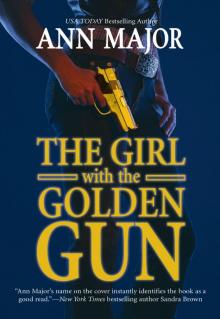 The Girl with the Golden Gun
The Girl with the Golden Gun Silhouette Christmas Stories
Silhouette Christmas Stories To Tame Her Tycoon Lover
To Tame Her Tycoon Lover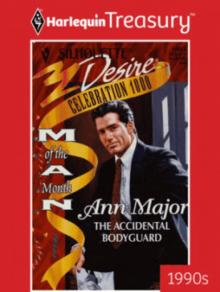 The Accidental Bodyguard
The Accidental Bodyguard Ultimatum: Marriage
Ultimatum: Marriage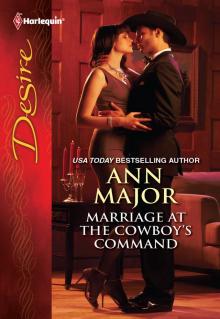 Marriage at the Cowboy's Command
Marriage at the Cowboy's Command Children of Destiny Books 4-6 (Texas: Children of Destiny Book 10)
Children of Destiny Books 4-6 (Texas: Children of Destiny Book 10)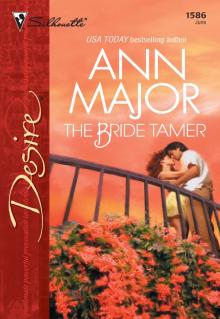 The Bride Tamer
The Bride Tamer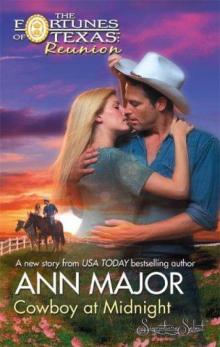 Cowboy at Midnight
Cowboy at Midnight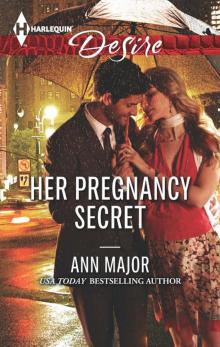 Her Pregnancy Secret
Her Pregnancy Secret Children of Destiny Books 1-3 (Texas: Children of Destiny Book 9)
Children of Destiny Books 1-3 (Texas: Children of Destiny Book 9) Terms of Engagement
Terms of Engagement The Accidental Bridegroom
The Accidental Bridegroom A Scandal So Sweet
A Scandal So Sweet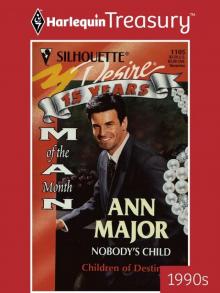 Nobody's Child
Nobody's Child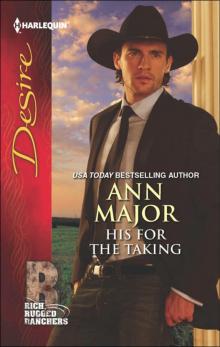 His for the Taking
His for the Taking The Girl with the Golden Spurs
The Girl with the Golden Spurs